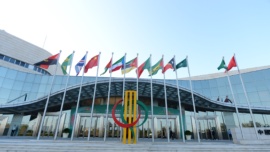Macau seldom notices the silent revolution that is taking shape in Hengqin, aside from the new skyscrapers that have been built on the other side of the river. But going further into the mountain – some three times the size of this gaming territory – dozens of residential and office towers are shaping the not-so-long-ago almost deserted island.
The three huge hotels that are part of the Chimelong theme park – two of them the biggest in China with their 1,600 and 1,888 rooms – are just the tip of the iceberg. The ocean resort is still expanding and in its plans are included seven more hotels to accommodate the tourists who want to entertain themselves near dolphins, polar bears and penguins.
Tunnels below the new highways allow for the expansion of hundreds of kilometres of cabling, avoiding the opening and closing of the roads like those that every day disrupt the livelihoods of Macau citizens.
Slowly, the project of a new city is taking shape. New offices, other mega hotels and sites already being developed by gaming operators here – like Galaxy, or Pansy Ho’s Shun Tak (which has a gaming licence with MGM) – will grow the hospitality offer of Hengqin.
A hospital is in the pipeline, in this earlier stage, and conveniences stores are already open even if the main part of the city, from schools to street restaurants and pharmacies, will appear at a later stage.
“At this moment, we’re still bringing more investors. Two-thirds of the first phase is already taken”, a source with in-depth knowledge of the business blueprint explains to Business Daily.
The municipality, however, decided to “compensate” for the lack of daily livelihood. And as a way to attract global attention, it is investing in international events. Last weekend, a full tennis centre saw world-ranked number 13 Petra Kvitova defeating – in the final lasting little over one hour – Elina Svitolina (world-ranked #14) by 6/4 and 6/2. With the victory, the Czech player gets closer to the Top 10 in the WTA Rankings, now at 11th position.
“This tournament is the third biggest in China and the top 10 or 12 on the WTA tour”, tournament Director Peter Johnston explained to Business Daily.
Now in its second year of a five-year contract, the WTA-sanctioned Zhuhai tour, in the new multipurpose billion-Renminbi tennis centre “is also the year-end championship”, says the Australian in charge of the event, showcasing the importance of the investment being made in a stretch of land that supported only mountains and empty fields just years ago.
Sport as an investment gateway
The US$2.2 million (MOP17.6 million/HK$17.1 million) tournament that brought high profile ambassador and former number one Steffi Graf doesn’t at this stage have a price tag, says Peter Johnston.
“A lot of tennis tournaments around the world aim for a global audience using the vehicle of entertainment to showcase [their] city”, he says. Zhuhai chose tennis to bring the world’s attention to the city and Hengqin, with the event broadcast to 22 countries.
Why tennis? The fact that a recent Grand Slam winner was Chinese Li Na, who achieved a career-high ranking of world number two, is no coincidence. “Because of her, tennis in China got many more fans”, says the previous WTA Asia Pacific Managing Director.
While the city invests in its sports structure and in bringing international events for more international exposure, the Huajin Securities WTA Elite Trophy Zhuhai is gaining momentum with more sponsors. Even if sponsorship is just part of the overall equation, reflects Mr. Johnston.
“There’s international broadcasting rights, corporate hospitality sales, tickets sales and other things around the tournament that generate revenues, like merchandise”, he says. “We’ve been doing really well with local sponsorship and this year we started to get a couple more outside the region, like Lexus, who wants to be more active with its brands. And I think the next couple of years will allow us to have an increase of investment outside the region”, he tells this newspaper.
Macau as complement
Having a major tennis tournament, in principle, blocks the aspiration of neighbouring areas, says Johnston. “It’s not only difficult to get these sanction tournaments but the tour also protects the number of events”, in order to maintain a larger impact. Also, “players can only participate in a certain number of them”, reminds the tournament director.
Macau, however, is seen as a “very important complement” to the event, in a first-time twist of statuses. Until today, Hengqin has always been seen as a complement to Macau’s growth. “Macau is a gateway for Hong Kong audiences and the fact that we’re so near is easier to attract top players”, Johnston notes, adding “almost every night” the high-ranking tennis players have been in Macau to dine.
























